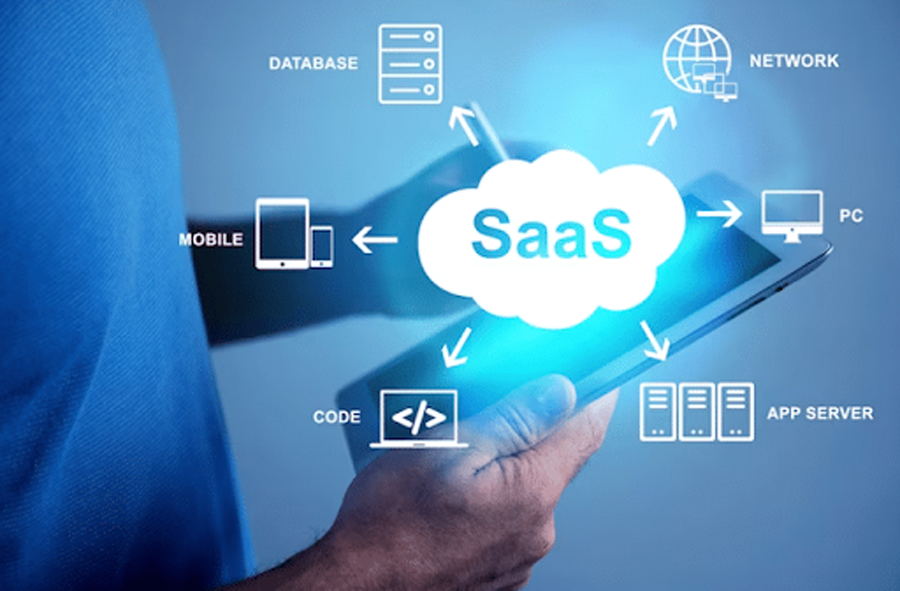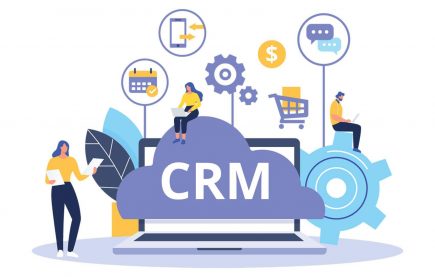
SEO Strategy for ERP SaaS
Source: Freepik
SaaS stands for Software as a Service. Usually, these are cloud-based solutions physically located on servers on the web. To illustrate, here are a few examples:
- Netflix streaming service
- iCloud cloud storage
- Office 365 ERP (enterprise resource planning)
- Zoho Creator ERP
- NetSuite CRM
- Adobe software package (Photoshop, Lightroom, etc.)
In brief, SaaS is any software that serves the user via the internet. Today, we will consider search engine optimization (SEO) for enterprise resource planning (ERP) SaaS products and the specifics of SEO strategies for them.
What is SaaS ERP Marketing?
SaaS ERP digital marketing involves promoting cloud-based ERP software solutions tailored to meet the needs of businesses looking to streamline operations, manage resources, and optimize workflows. Unlike the on-premise ERP system of yesteryear, the SaaS ERP is installed in the cloud. Hence, the ease of updating, better scalability, and lower upfront costs, which are the main benefits.
Digital marketing for ERP requires knowledge of specifics since businesses need smooth integrations, data security, and ways to scale growth. SEO-centered strategies will make sure the SaaS ERP providers reach relevant audiences, gain better visibility in search engines, and drive targeted traffic interested in such scalable business solutions.
There is, perhaps, one main feature of SaaS that must necessarily be taken into account when promoting:
- The SaaS product will change over time, and you can’t 100% predict what it will be like in a month, a year, or five years. Netflix was delivering movies on VHS tapes in 1997. Streaming and producing your own video content was unthinkable back then.
SEO Role in SaaS ERP Marketing
SEO for ERP SaaS serves to maximize the coverage of semantics in the niche and, at a rapid rate, test as many ways as possible to build organic traffic. From a technical standpoint, there is no special difference between the methods of SEO promotion of agency sites and SaaS.
In many aspects, SEO for ERP SaaS is almost no different from SEO for promoting other products on the internet—goods, services, and agencies. However, SaaS involves a subscription-based payment model. This means the project must constantly stay at the top of the search engine to attract new target audiences like manufacturing business owners and retain existing ones.
Consequently, ERP SaaS promotion is usually even more comprehensive and extensive than other products. Therefore, ERP SaaS SEO is sometimes significantly more expensive. However, in the end, it provides you with a permanent, not one-time profit, and all investments pay off.
Another important thing here is the variability of SaaS products themselves and their evolution. As SaaS products rapidly develop, expand, and sometimes radically change, each change brings its own adjustments to the SEO strategy.
ERP SaaS marketing on the web requires you to be flexible, enterprising, and ready to reorganize your SEO strategies and principles.
Key Elements of a Successful SEO Strategy for ERP SaaS
Below are the main elements that will make it easier for you to promote your ERP in search results.
On-Page SEO
On-page SEO directly impacts how search engines understand and rank your ERP SaaS pages. This directly impacts how quickly you will get to the top of search results:
- Crawlability and indexability. Ensuring all key website pages can be indexed is critical for online visibility. Using a website crawler tool by SE Ranking, SaaS ERP providers can scan their website pages, links, images, CSS, and JavaScript files to uncover hidden technical issues. Technical SEO includes blocked pages, broken links, and other elements preventing proper crawling and indexing and, ultimately, affecting rankings.
- Content quality. The SaaS ERP audience expects clear, informative content that addresses their unique business challenges. High-quality, relevant content helps improve user engagement, decreases bounce rates, and drives organic traffic. Aiming for depth, accuracy, and relevance in blog posts, product descriptions, and support documentation adds value and enhances rankings.
- Keyword usage. Strategic keyword placement across landing pages, blogs, and service descriptions helps align content with users’ search intent. For SaaS ERP, keywords should include industry-specific terms like “cloud ERP solutions,” “scalable ERP software,” and “real-time data analytics ERP.” Proper keyword research ensures terms match what businesses are searching for, maximizing visibility.
These on-page SEO efforts ensure your ERP SaaS website is optimized for online visibility, relevance, and customer engagement.
Off-Page SEO
Off-page SEO for ERP SaaS extends beyond the website, building authority and credibility in the industry by establishing valuable, relevant connections online:
- Backlinks. Off-page SEO relies heavily on backlinks from credible sources. For ERP SaaS providers, quality backlinks from industry publications, tech blogs, and educational institutions can build domain authority. In turn, they show search engines that the website is trustworthy and relevant. This helps improve rankings, drives referral traffic, and broadens the audience reach.
Effective backlinking not only improves search rankings but also supports brand authority. It creates a positive feedback loop where enhanced visibility management leads to more links, more traffic, and a larger, more engaged audience.
Integrating ERP with SEO Efforts
Integrating ERP functions with SEO efforts means aligning marketing goals with overall product goals to achieve consistent messaging and increased visibility. For instance, sales and customer insights from the ERP system can affect SEO-driven content by highlighting what features resonate with customers.
Additionally, incorporating SEO goals into ERP systems can help manage and track lead data, making it easier to personalize content. This integration enables ERP SaaS providers to optimize for search engines and align content creation with customer interests, creating a more cohesive customer journey.
Measuring SEO Success for ERP SaaS
Here are the key metrics you can use to measure SEO effectiveness for ERP SaaS:
- Revenue. Tracks overall SEO performance and financial contribution.
- Conversion. Highlights effective and underperforming strategies.
- Keyword SERP ranking. Assesses keyword strategy success.
- Organic traffic by content. Reveals lead generation content.
- ROI from organic. Shows returns on SEO investment.
- Backlinks. Offers insights into content value and authority.
- MRR from organic. Identifies high-performing pages to focus on.
- Organic CTR. Analyzes customer journey flow and sentiment.
Over time, data from these KPIs will reveal insights into audience behavior, content performance, and growth opportunities. This way, you will easily adapt your SEO strategies to market demands and more quickly improve your positions in search results.
ERP SaaS With the Best SEO Strategy
Here are the top ERP SaaS solutions that leverage SEO to achieve global reach and attract businesses of all sizes.
Zoho Creator
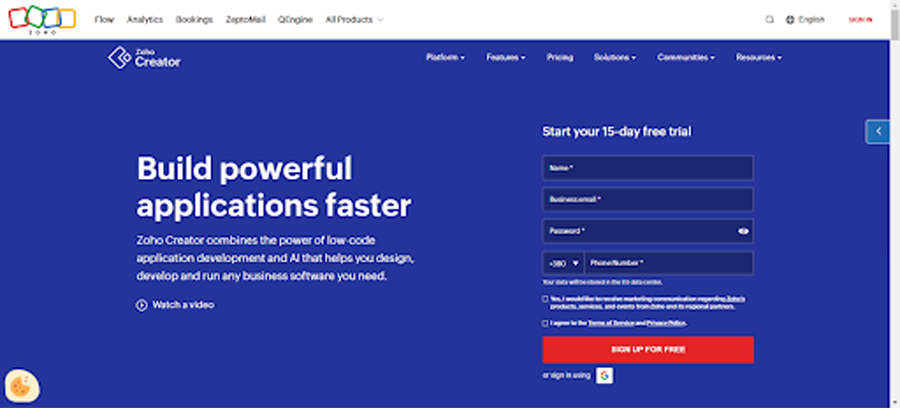
Source: Google
Known for its easy-to-use ERP platform, Zoho Creator uses SEO-driven content to target small, medium, and enterprise businesses looking for affordable solutions and flexibility. Their SEO strategy focuses on niche keywords related to customization. They also make continuous efforts to create the extensive backlink profile.
As a result of this strategy, the top Zoho pages in SERP are Zoho tools. According to data from SE Ranking, in the US market, the best-performing pages are tool landing pages, with business email and free purchase generator tools bringing in 21% and 12% of traffic, respectively.
The share of informational keywords is the biggest, with high positions in keywords like “email with domain name” or “software for inventory management.” In total, Zoho ranks for over a million keywords worldwide, many of which are niche informational queries.
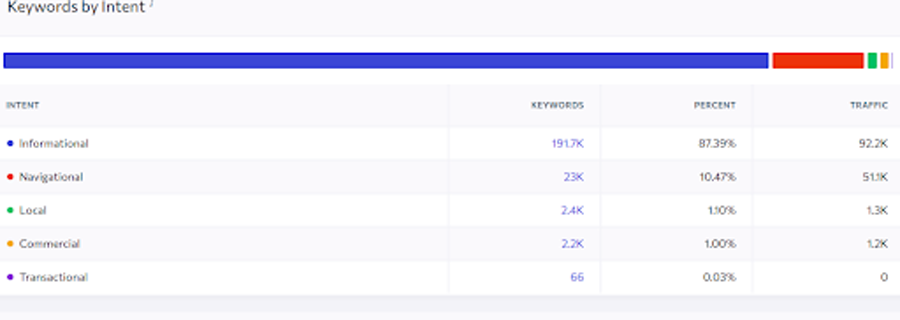
Source: SE Ranking
Thanks to Zoho’s immense popularity, a lot of keywords are also navigational, meaning users are specifically trying to access Zoho’s website.
They also make continuous efforts to create the extensive backlink profile. In total, Zoho has 12 million backlinks pointing to the site from 142 thousand domains. During some months of 2024, they could earn up to 600 thousand backlinks.
Zoho is also uniquely positioned to attract backlinks because many point to Zoho Writer documents.
Microsoft Dynamics 365
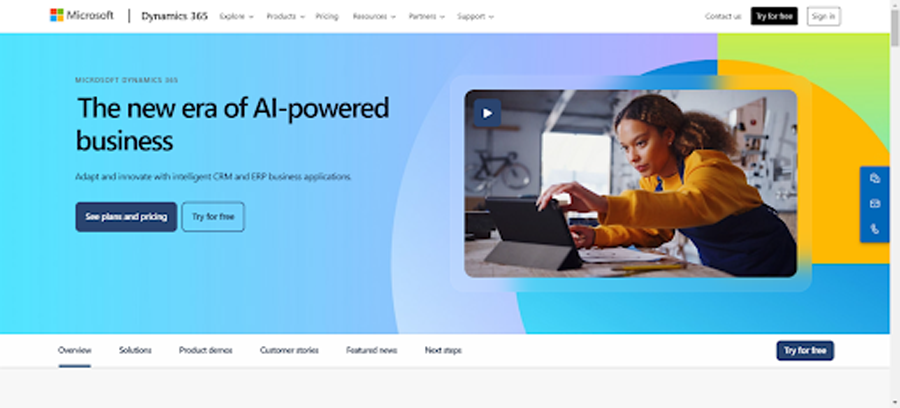
Source: Google
With a reputation for scalability and integration with other Microsoft products, Dynamics 365 targets enterprise-level and manufacturing business customers. Its SEO strategy focuses on keywords highlighting large-scale deployment, cloud security, and ERP for enterprises. This way, it is visible to organizations with complex needs.
The decades-long history of PR helps a lot with SEO for MS Dynamics. The main website, Microsoft.com, has 400 million backlinks because Microsoft products are well-known, and people talk about them on the web, leaving a link.
The popularity of the tool also influences the traffic this tool receives. The top keywords it ranks for are navigational because users know the tool and want to learn about it. For instance, the keyword “Microsoft Dynamics” has a 20 thousand search volume, and many variations of the tool’s name have this metric ranging from 20 to 5 thousand.

Source: SE Ranking
Of course, the Microsoft Dynamics page ranks first for most of them, thanks to careful keyword optimization.
Another strategy the MS team uses is sharing SEO efforts between tools. There are over 200 thousand backlinks pointing to the Dynamics 365 page, and a good deal of those are from websites of other Microsoft products like Skype and MS Office.

Source: SE Ranking
Summary
The execution of a successful ERP SEO strategy is what will bring you competitive advantages in search engines and effective customer acquisition. ERP SEO requires a strong foundation in on-page and off-page optimization and agility to adapt to the evolving nature of the SaaS product. An ERP SaaS company will earn trust and unlock targeted organic traffic with:
- High-quality content,
- Strategic keyword usage, and
- Authoritative backlinks.
The continuous measurement of performance against goals will also ensure that the strategies are channeled toward business goals, thus facilitating steadiness in growth.

